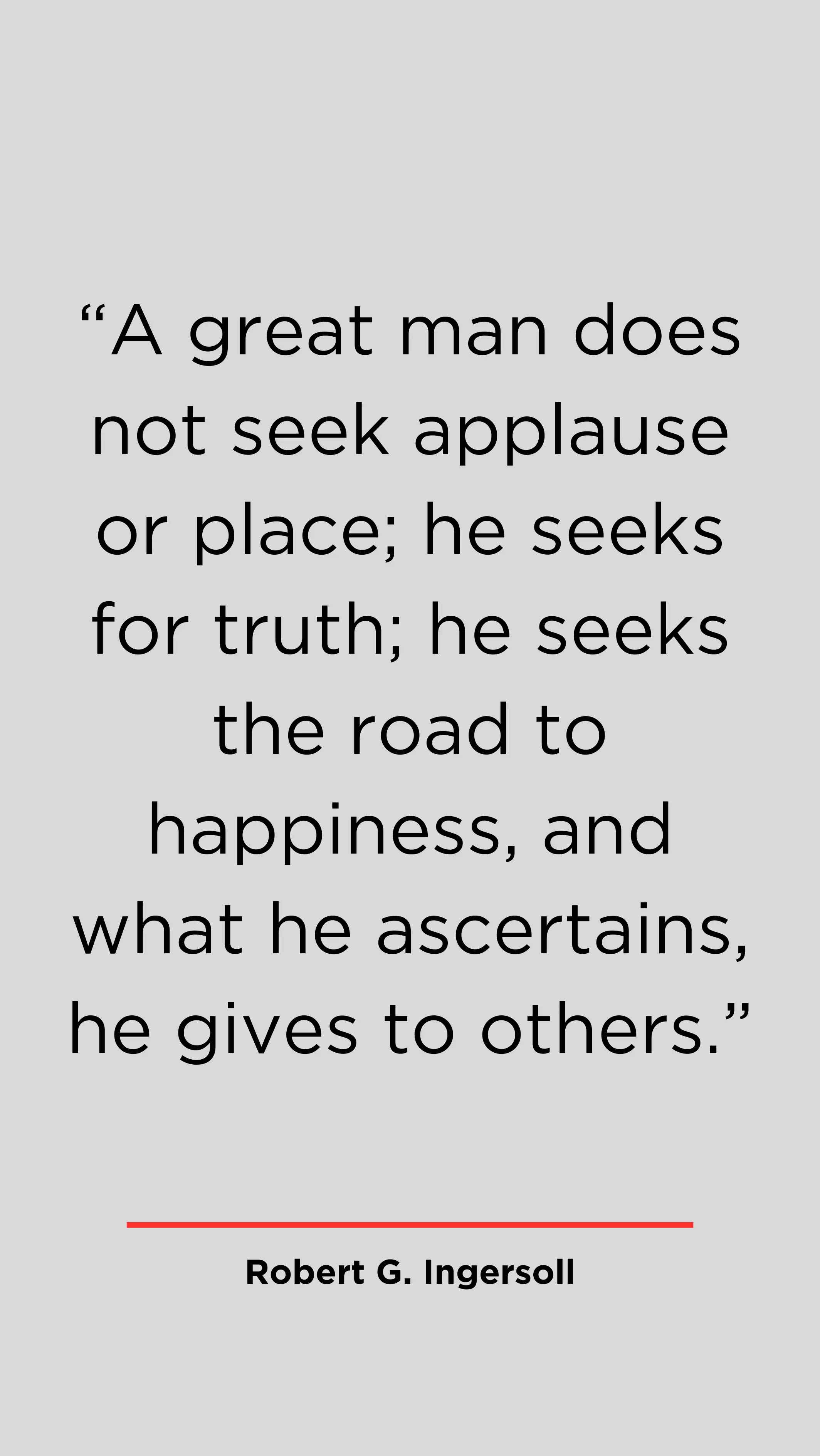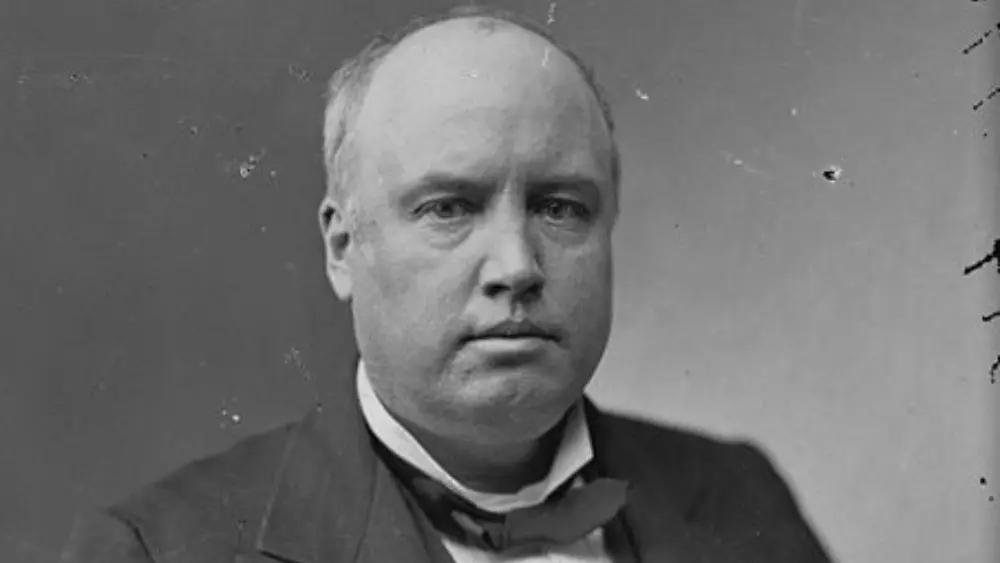Robert G. Ingersoll, born on August 11, 1833, in Dresden, New York, emerged as one of America’s most celebrated orators and influential freethinkers during the latter half of the 19th century. Known for his eloquent speeches and unwavering commitment to secularism, Ingersoll played a significant role in challenging religious orthodoxy and promoting rationalism.
Early Life and Legal Career
Robert G. Ingersoll’s early life and legal career were defined by a combination of diverse influences and professional success. Growing up in a family that embraced religious diversity, Ingersoll was exposed to a variety of faiths, laying the groundwork for the skepticism that would later define his public persona. This early exposure to different belief systems likely played a role in shaping his views on religion, paving the way for his later role as one of the most prominent advocates for secularism and freethought in 19th-century America.
After pursuing a legal education, Ingersoll entered the legal profession and quickly gained recognition for his prowess as a criminal defense attorney. Known for his eloquence and persuasive oratory skills, he became a prominent figure in legal circles. Ingersoll’s success in the legal arena not only established him as a respected attorney but also provided a platform for his later endeavors as a lecturer and orator on topics ranging from politics to religion, where he would become famous for his critiques of religious dogma and advocacy for reason and rationalism.
Robert G. Ingersoll: Military Service and Political Engagement
Robert G. Ingersoll’s life took a patriotic turn during the Civil War when he served as a colonel in the Union Army. His time in the military showcased not only his commitment to the Union cause but also his leadership skills and eloquence, which would become defining features of his later public career. Ingersoll’s military service contributed to his reputation, and his post-war transition to politics marked the beginning of his engagement in broader public affairs.
While Ingersoll’s foray into electoral politics, including an unsuccessful bid for the governorship of Illinois, did not result in elected office, it played a crucial role in establishing him as a prominent figure in political circles. His involvement in politics further elevated his public profile, setting the stage for the influential role he would play as a public intellectual, orator, and advocate for secularism in the later decades of the 19th century.
Oratory Skills and “The Great Agnostic”
Renowned for his compelling oratory skills, Robert G. Ingersoll was aptly titled “The Great Agnostic.” His speeches, delivered to sizable audiences, showcased a remarkable ability to address a diverse array of subjects, navigating through realms such as religion, politics, and societal concerns. Ingersoll’s eloquence was complemented by his sharp wit, a keen sense of humor, and a commanding delivery that held audiences rapt with attention.
Ingersoll’s speeches weren’t just rhetorical displays; they were persuasive, thought-provoking, and often challenging the prevailing norms of his time. His fearless critiques of religious orthodoxy, advocacy for secularism, and insightful commentaries on contemporary issues left an indelible mark. Beyond merely entertaining crowds, Ingersoll’s oratory was a force for change, prompting reflection and sparking conversations that resonated far beyond the auditoriums where he spoke.
Robert G. Ingersoll: Champion of Secularism and Freethought
A prominent advocate for secularism and freethought, Robert G. Ingersoll stood at the vanguard of the movement, fervently championing the principle of separating church and state. His eloquent speeches and prolific writings served as a rallying cry for reason, science, and the pursuit of individual freedom, challenging the entrenched dogmas of organized religion. Ingersoll’s commitment to promoting a more secular society was grounded in his belief in the importance of intellectual autonomy and the right of individuals to form their own beliefs unencumbered by religious dictates.
Ingersoll’s impact on the secular movement extended beyond his time, laying the groundwork for a tradition of freethought that persisted through the decades. His legacy as a fearless critic of religious orthodoxy and a proponent of rational inquiry endures, influencing subsequent generations of freethinkers and contributing to the ongoing discourse on the role of religion in public life.
Lectures on Religion and Morality
Robert G. Ingersoll’s renowned lectures, notably “The Gods” and “Some Mistakes of Moses,” were powerful critiques of religious doctrines that aimed to expose what he considered inconsistencies in traditional beliefs. In these compelling addresses, Ingersoll fearlessly questioned the foundations of religious dogma, challenging prevailing notions about the divine. Through his eloquent and often humorous rhetoric, he dissected various aspects of religion, sparking contemplation and debate on matters of faith.
One of Ingersoll’s notable emphases was the promotion of morality independent of religious doctrines. He argued passionately that ethical principles could be derived from reason and humanistic values rather than being solely dictated by religious authorities. In doing so, Ingersoll contributed to the evolving discourse on morality, urging individuals to consider the importance of ethics grounded in human reason and compassion rather than adherence to religious tenets.
Robert G. Ingersoll: Legal Defense of Freethought
Beyond his prowess as an orator, Robert G. Ingersoll carved a significant niche in legal advocacy, particularly defending freethinkers facing blasphemy or heresy charges. In an era marked by rigid social norms and restrictions on free expression, Ingersoll fearlessly championed the cause of intellectual liberty. His legal defense work was instrumental in challenging the constraints placed on those who dared to question religious orthodoxy, contributing to the broader movement for freedom of thought.
Ingersoll’s commitment to defending freethought through legal means aligned with his broader mission to promote reason, skepticism, and secular values. By utilizing the legal arena as a platform, Ingersoll not only challenged societal norms that stifled intellectual freedom but also contributed significantly to the advancement of secularism. In doing so, he played a pivotal role in safeguarding individuals who sought to express their dissenting views in an often conservative and dogmatic society. Furthermore, his strategic use of legal discourse not only resonated within legal circles but also reverberated throughout broader intellectual conversations.
Personal Life and Public Persona
Robert G. Ingersoll’s personal life provided an intriguing contrast to his public persona as a vocal freethinker. Despite his outspoken skepticism and resolute criticism of religious doctrines in the public sphere, Ingersoll’s private life presented a stark contrast, characterized by a remarkably happy marriage and close-knit family bonds. Nevertheless, this apparent dichotomy doesn’t diminish the complexity of his persona; rather, it adds layers to our understanding of the man behind the public figure. Furthermore, it showcases the intriguing interplay between his public convictions and private affections. His wife, Eva Ingersoll, and their two daughters played significant roles in his life, creating a nuanced picture of a man who navigated the complexities of his personal beliefs and public expressions.
Ingersoll’s ability to reconcile his public advocacy for freethought with a private life centered on strong family ties added depth to his character. The contrast between his critiques of religious institutions and the warmth evident in his domestic relationships highlights the multifaceted nature of a figure who sought intellectual freedom in the public sphere. Simultaneously, he found fulfillment in personal connections within the confines of his home. Moreover, this duality underscores the complexity of his character as he navigated the intricate balance between public advocacy and private joy. Furthermore, it unveils the intricate layers of his persona, revealing a man dedicated to challenging established norms on one front and cherishing meaningful relationships on another. In essence, the dichotomy between his public and private life paints a nuanced portrait of a figure whose intellectual pursuits and personal bonds coexisted, creating a captivating narrative of a life rich in contrasts and depth.

Robert G. Ingersoll: Legacy and Influence on American Thought
Robert Green Ingersoll’s indelible legacy significantly impacted American thought, ushering in a new era of intellectual discourse that challenged conventional beliefs. His influential ideas ignited a paradigm shift in how society approached morality and religion, fostering open-mindedness and critical thinking. In addition to stirring minds, Ingersoll’s eloquent speeches acted as a catalyst for progressive movements, contributing to a broader cultural transformation. His commitment to free thought and rational inquiry continues to shape contemporary intellectual discourse. As a prominent advocate for reason, secularism, and free thought in the late 19th century, Ingersoll’s fearless critiques of religious dogma and defense of individual freedom inspired a new generation of skeptics and agnostics, challenging norms with enduring impact.
Ingersoll’s influence extended beyond his immediate time, leaving a lasting imprint on the broader American intellectual landscape. His ideas continued to contribute to debates on religion, morality, and the separation of church and state. In the evolving tapestry of American thought, Ingersoll’s legacy endures as a beacon for those championing intellectual freedom, critical inquiry, and the pursuit of knowledge independent of religious constraints.




